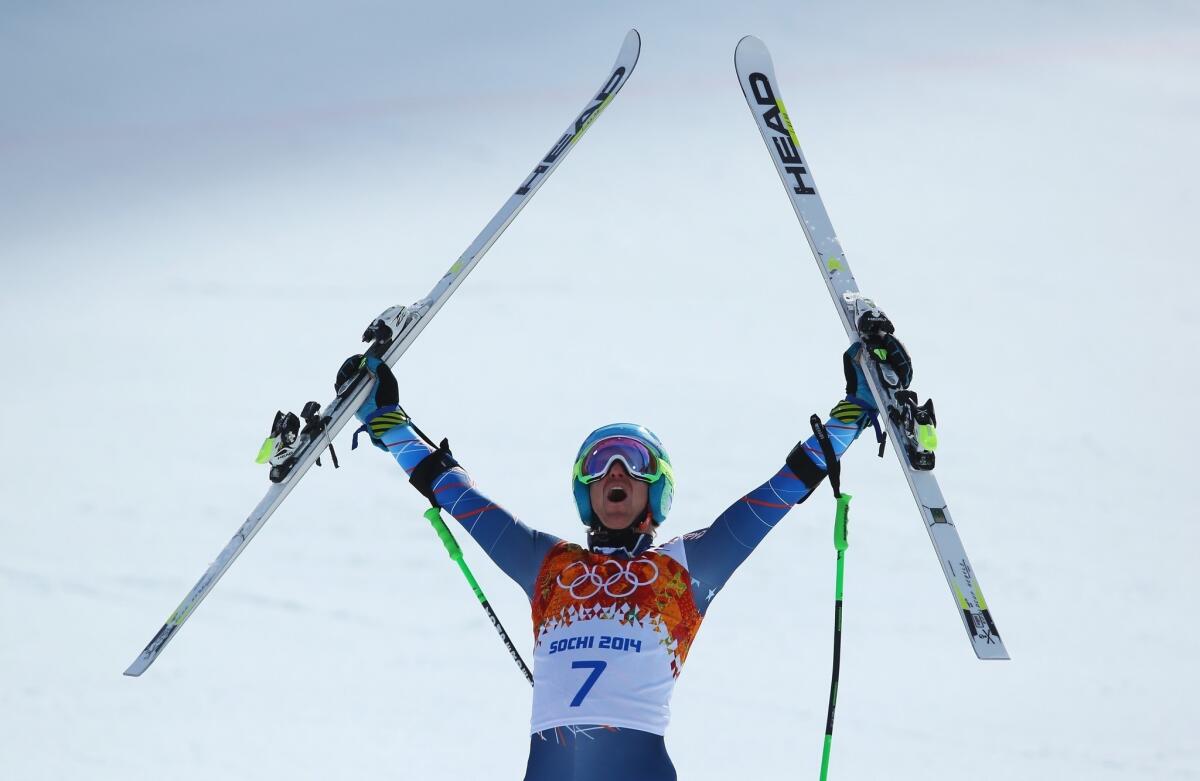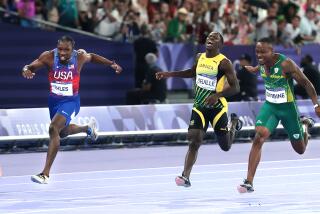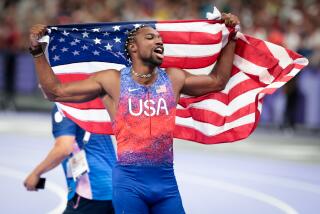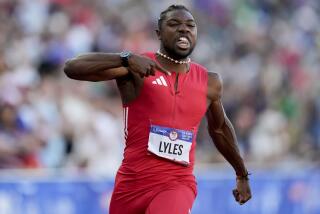Sochi Olympics: Ted Ligety of U.S. wins gold medal in giant slalom

- Share via
SOCHI, Russia — Ted Ligety’s first Olympic gold medal in 2006 was such a gift, it all but fell out of the sky from a gondola.
It was like a kid winning an Oscar without taking acting lessons.
Ligety was 21 in Turin, Italy, when he struck gold in the super combined, only because Bode Miller blew gold by missing a gate in his first slalom run and Austria’s Benny Raich blew gold by hooking a second-run gate within feet of the finish line.
FRAMEWORK: Best images from Sochi
Ligety’s second Olympic gold medal, won Wednesday at Rosa Khutor under postcard conditions, lifted the weight of his world.
It had gravitas.
Ligety did one of the hardest things you can do in sports: win at the Olympics when everyone expects you to win.
The best giant-slalom racer of his generation would have had to answer questions all the way through customs if he left Russia without the GS gold in his backpack.
Wednesday’s gold ratified Ligety’s greatness, justified his travails, silenced his critics and put his winless Vancouver Olympics in the rearview mirror.
“I’ve answered Vancouver questions for the last four years,” Ligety said. “My best years have been since then, in a lot of ways because of that.”
His comfortable win by .48 of a second, with a two-run time of 2 minutes 45:29 seconds, completed Ligety’s legacy arc.
Like a ski run, he rode the ragged edge from Vancouver to Russia before crossing the finish line to end all doubt.
French racers Steve Missillier and Alexis Pinturault won the silver and bronze. But this was Ligety’s coronation.
Miller, his teammate who finished 20th and 2.53 seconds behind Ligety, could only bow to the champion.
“There is no question who the best GS skier in the world is,” Miller said after what was probably his last Olympic race.
Raich, 35, the great Austrian who won GS gold in 2006, doesn’t even pretend he can compete with Ligety anymore.
Raich finished seventh, 1.06 off the pace.
“It is impossible,” he said. “I have tried it all. I’ve given all my power and have still lost. This is the last time for me.”
U.S. skier Tim Jitloff, who finished 15th, almost two seconds behind the winner, said Ligety reminds him of tennis star Roger Federer in his prime.
“Everyone’s like, ‘What do you do, how do you beat him?’” Jitloff said.
There is a thin line, of course, between explanation and exclamation. Had Ligety gone down on his hip in the second run, as it appeared he might, it would be a different story.
“Ski racing is probably the least guaranteed sport out there,” Ligety reminded.
Because Ligety did what he was supposed to, he can be exalted as the first American man to win two Olympic Alpine gold medals.
Everyone knew what was at stake since Ligety finished ninth in GS at the Vancouver Olympics.
“At a certain point, I’m ‘let’s do this already, let’s just get this thing over,’” Ligety said of Sochi. “So we can stop talking about the pressure and everything with it.”
The unfinished business followed Ligety into Sochi after he failed to medal in the super combined and super-G.
“You guys are tough on him,” Ted’s mother, Cyndi, told a group of reporters. “Calling him different things, he’s faltering, whatever.”
She and Bill Ligety, Ted’s dad, were nervous before the race.
“You’re just on the edge,” Bill said.
Holding a big lead in ski racing isn’t as easy as it sounds.
Ligety dominated the first run with a crisp, clean run and took a .93-second lead into halftime.
In GS, the order for the top 30 after the first run is reversed for the second run. Ligety would ski last among the leaders and know exactly where he stood before he left the start gate.
Ligety definitely took fewer chances on his second run but said, “There is no such thing as being completely in control in ski racing.”
It looked as if Ligety nearly lost it at one point when he went down on his hip around a gate.
Ligety later said he never felt he was going to fall, but you might have had a hard time convincing his parents.
“Ski racing is still two runs,” Bill Ligety said. “It doesn’t matter how far ahead you are in the first run. There’s a fine line between almost falling the whole way down or being too conservative.”
Ted held the line. He gave away more than a second of his lead but still had .48 to spare.
Ligety knew he won when the scoreboard flashed “green” after his time.
Green, for Ligety, meant gold.
Twitter: @dufresnelatimes
More to Read
Go beyond the scoreboard
Get the latest on L.A.'s teams in the daily Sports Report newsletter.
You may occasionally receive promotional content from the Los Angeles Times.







